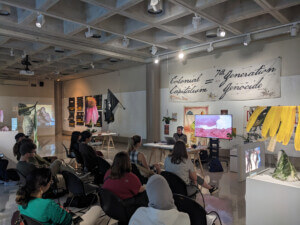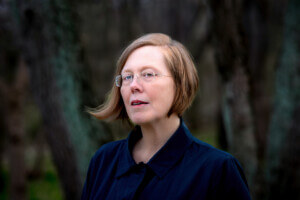Two recent letters sent to the Southern California Institute of Architecture (SCI-Arc) community announced a number of policy and staff changes at the Los Angeles–based independent architecture school. The changes follow an independent review and inquiry process executed by a third-party firm into the recent troubling allegations from students regarding several SCI-Arc faculty members. The full report has not yet been made accessible.
The two separate letters, provided to AN by SCI-Arc, came from Kevin Ratner, Chairman of the Board of Trustees, and Hernán Díaz Alonso, SCI-Arc director/CEO, respectively. They both outline faculty change as well as an overhaul to the school’s student internship policy. According to Ratner’s letter, the independent inquiry was overseen by the school’s Board of Trustees.
The review into the allegations followed a heated roundtable discussion about professional practice within the architecture industry that took place in March and was livestreamed. The talk prompted a school-wide, and subsequent public conversation, around the academic culture at SCI-Arc. Students circulated petitions to remove faculty members from their roles, including that of then–undergraduate chair Tom Wiscombe and then–history and theory coordinator Marrikka Trotter. Both Wiscombe and Trotter were placed on administrative leave earlier this year. Students in a studio course led by Wiscombe claim the professor and architect of the eponymous firm Tom Wiscombe Architecture asked them to work long days for his studio in lieu of completing traditional architecture education assignments.
According to the letter signed by Díaz Alonso, Wiscombe and Trotter have resigned as faculty at the school, and SCI-Arc has accepted their resignations.
Presently, William Virgil and Darin Johnstone hold the positions of Undergraduate Program Chairs, and the school is searching internally for someone to permanently assume the leadership role. Additionally, John Cooper, Erik Ghenoiu, and Marcelyn Gow will assume the position of history and theory cocoordinators this fall; they currently serve in that role as acting cocoordinators.
“On behalf of the Board of Trustees, I am pleased to announce that an outside, independent firm has completed a thorough inquiry into allegations that didn’t align with the values SCI-Arc has established in its first half-century,” Ratner stated in his letter. “Some policy changes are being made as a result. Each is designed to ensure a safe, equitable, and transparent environment for our entire community.”
“To the extent that we — or the industry — went astray, we take seriously our role as stewards of architecture practice and are working to restore any loss of trust that may have resulted,” the Chairman added. “SCI-Arc’s goal is to guide our students to become strong, innovative architects who will shape the future.”
Both letters also addressed policy changes the school plans to implement, these include:
- Creation of a Career Services Advisor
- Creation of a Working Group to Recommend Improvements in Internship and Scholarship Policies
- Upgrading Scholarship Process for Continuing and Graduate Thesis Students to Provide More Transparency
- Making Teaching Assistant (TA) Job Opportunities More Transparent
- Updating Faculty and Student Handbooks
The new Career Services Advisor will be responsible for educating present and past students on employment-related tasks, including resume and interview preparation and job placement. The Working Group, comprised of faculty, staff, students, and alumni, will be tasked with identifying and making improvements to the school’s internship and scholarship policies.
Revisions to the Internship Policy follow the student allegations against former faculty including Wiscombe. Under the new code all internships—including those for credit—must pay workers no less than minimum wage and must meet state and federal laws concerning employment, notably those related to overtime and working conditions. Additionally, SCI-Arc Directors and Chairs are not allowed to hire matriculating students during their appointment and, similarly, teaching faculty cannot hire enrolled students or Teaching Assistants during the term in which they are enrolled in the course. Updates have been made to how Teaching Assistant positions are procured to ensure transparency.
On top of this are additional measures such as a requirement that asks faculty to notify the Career Services Advisor prior to hiring a student as an intern and to then outline the expectations of the position. Upon the completion of the internship there will be an exit interview process, and the school will also create a database listing potential internship employers.
The Student Scholarship Process is another element of the revised policy changes. Under the revisions, there will be two new levels of faculty committee and administrative review for awarding the 2022 Graduate Thesis and Continuing Student scholarships. And similarly, the school is still in the process of assessing the policy and protocol for awarding institutional scholarships.
Among the policies and changes still under review are updates to student and faculty handbooks, especially related to the transparent hiring of teaching and research assistants. Changes to grading processes, the formation of an Extern Program, and revisions to Professional Practice curriculums are also pending further review.
The work does not end with these revised policy changes. The school admits that changes are iterative and conditions and expectations will continue to adapt as the architecture field and education landscape progress. In the United Kingdom., University College of London’s Bartlett School of Architecture recently published findings from its own independent investigation into bullying, verbal and physical abuse, and sexual misconduct and harassment at the school.
“We recognize that societies aren’t static, and neither are industries. Disciplines need to evolve and adapt, and we are committed to being part of the guidance of architecture, “ wrote Díaz Alonso in his letter to the SCI-Arc community. “Architecture is more than buildings. It is a cultural practice and a holistic way of understanding the world, and SCI-Arc is celebrating its first half century of pursuing this goal. Thank you for the consistent reminder that we are active participants in this process.”
AN will keep readers updated as this story develops.











